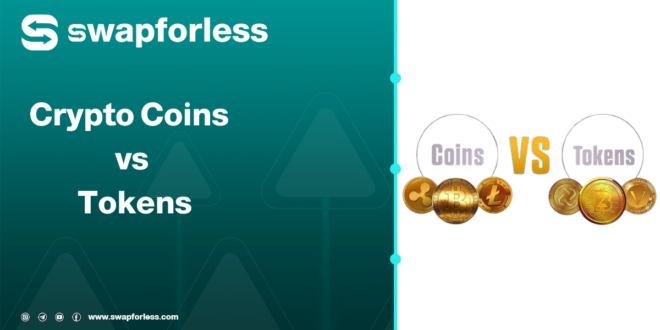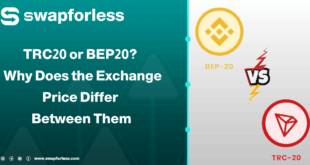You’ve most likely already heard of “Ethereum” or “Bitcoin”—these” are now household names when it comes to finance and tech.
You’ve most likely never even considered the difference between coins and tokens you hear so much about.
Understanding Crypto Coins vs tokens and the differences between coins and tokens to make more conscious decisions if you are considering investing or just learning to know the way newer technologies operate.
Here we will outline the fundamental differences between Crypto coins and tokens in easy and straightforward language, not using technical terminology.
What are cryptocurrencies?

Cryptocurrencies are digital assets that exist independently on their own networks. The best-known is Bitcoin, the first cryptocurrency to be created.
What distinguishes cryptocurrencies is that they are not just random digital tokens; rather, they operate based on specific technological principles that guarantee their security and openness.
For example, Bitcoin has its own network called a “blockchain,” which is an encrypted record that is difficult to hack or alter.
Each transaction recorded on this record is open to the public and can be verified. But why are we calling them “coins”?
Just because they are like old-fashioned money in their essential function, you can use them to purchase goods, pay someone back, or keep them as a store of value.
But Bitcoin and Ethereum aren’t backed by any nation-state or institution, so no one controls them.
Top 5 cryptocurrencies to invest in 2025: Invest Smartly!
What are Tokens?

Tokens are not independent currencies but are digital assets that are founded on the basis of an existing network.
Tokens need not have their own blockchain but utilize existing networks such as the Ethereum network.
Tokens are similar to “coupons” or “gift cards.” You spend them to acquire specific goods or services within a specific network.
There are tokens used to buy digital tools or characters in computer games and tokens used to fund startups via smart contracts.
Tokens are not just money; tokens can represent almost anything: ownership rights, company stock, one vote on election day, or even physical property such as real estate. Tokens are more flexible than cryptocurrency because of this.
Cryptocurrencies and 10 Common Cryptocurrency Terms
Crypto Coins vs Tokens

Let’s discuss Crypto coins vs Tokens, and the differences between Crypto coins and tokens in plain language with examples so that it is easier to comprehend.
The Foundation
One of the main differences between crypto coins and tokens is that the latter operate on their own networks, while the former utilize existing networks.
Imagine you own your own house that is yours and yours alone. Your house is like a cryptocurrency. Why not? Just because cryptocurrencies each have their own “private networks.”
Bitcoin exists on its own network and does not need anybody or another system to support it.
Tokens are very distinct. It is like the above case, but you are renting an apartment within another person’s building. Tokens operate in this manner: they are founded on pre-existing networks.
For example, the USDT token (US dollar equivalent) doesn’t have its own network but exists on the Ethereum network or other big networks. So, if the Ethereum network has problems, it would, in turn, affect the tokens that are based on it.
Functions
They are designed to serve as an exchange medium to buy something or transfer someone else’s money via the Internet without the involvement of banks and middlemen. These resemble traditional money but are digital in character and operate on a distributed network.
Tokens are used in more diversified applications. Some tokens are used as investment vehicles, where you buy them now in anticipation that they will increase in worth tomorrow.
Other tokens represent ownership rights, such as having ownership in a particular venture or startup.
Other tokens are used to gain access to particular services, such as subscribing to a digital service, decentralized finance (DeFi), or playing blockchain games.
Legal Regulation
Cryptocurrency falls within the scope of money or medium of exchange and is thus governed according to the laws of conventional currency in the majority of states.
Some states may even impose taxes on the use of Bitcoin or prohibit its use as a medium of exchange.
Tokens fall within the scope of different types of laws depending on their use. If the token is used to represent ownership of a stake in a venture, it is treated as a “security” or “investment” and is thus governed according to securities law.
Security
They operate on their own networks, and therefore their security is dependent on the strength and structure of the networks.
The Bitcoin network is one of the most secure networks in the world since it operates on its “Proof of Work” mechanism of agreement.
The security of tokens is dependent on the security of the networks on which they operate. If the underlying network (e.g., Ethereum) is hacked or has a technical error, it could risk compromising all the tokens that operate on it. Therefore, tokens could potentially be more exposed to security risks.
Flexibility to Change
They are fixed and not easily modified. Bitcoin’s behavior is only updateable through very large updates that require the majority of the network to agree.
Tokens are more flexible, as new tokens can easily be minted according to the needs of specific projects. A startup can mint its own token to denote ownership of its project or to offer specific services.
Underlying Value
The value of cryptocurrencies comes primarily from their scarcity and use as a medium of exchange. For example, Bitcoin has a limited supply (only 21 million coins), making it scarce and giving it economic value.
The value of tokens depends on what the tokens represent or the project they support. For example, the USDT token represents the US dollar, so its value is tied to the dollar.
In Conclusion:
You might think the differences between Crypto coins and tokens aren’t necessarily important, but in reality, this understanding can be crucial.
If you don’t understand Crypto coins vs tokens, you might find yourself investing in a token thinking it’s a cryptocurrency, or vice versa.
When you clearly understand these differences, you’ll be able to make more informed and confident decisions when dealing with these assets.
Whether you want to use cryptocurrencies as a means of payment or invest in new projects through tokens, the digital future is full of exciting opportunities to discover.
 swapforless blog
swapforless blog



